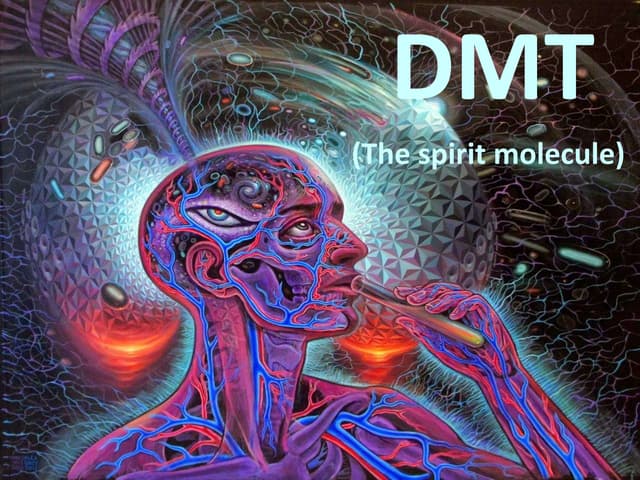Beyond the Brief Journey: Exploring the Reported Potential Advantages of DMT
N,N-Dimethyltryptamine (DMT), often dubbed “the spirit molecule” due to the profound, often mystical experiences it elicits, is a naturally occurring psychedelic compound found in numerous plants and animals, including humans. While illegal in most parts of the world and associated with an intense, short-acting trip, a growing body of preliminary research and anecdotal reports are cautiously exploring its potential advantages, particularly in therapeutic and introspective contexts.
It is crucial to state upfront: DMT is a Schedule I controlled substance in many countries, making its possession, use, and distribution illegal. The information presented here is for educational purposes, exploring potential areas of research and reported benefits, and does not advocate for illegal use. The use of psychedelics can carry significant risks and should only be considered under strict medical, ethical, and legal frameworks.
With these critical caveats in mind, let’s delve into the reported potential advantages of DMT:
- Profound Mystical Experiences and Spiritual Insights
Perhaps the most commonly reported “advantage” of DMT is its capacity to induce an incredibly intense and often overwhelming mystical experience. Users frequently describe:
Encounters with entities: Beings, aliens, or “machine elves” are common themes.
Access to alternate realities: Visions of intricate geometric patterns, alien landscapes, and cosmic vistas.
Ego dissolution: A temporary but profound sense of the self dissolving, leading to a feeling of oneness with the universe.
Spiritual breakthroughs: Many report gaining deep spiritual insights, a reduction in the fear of death, increased feelings of interconnectedness, and a renewed sense of purpose or understanding of existence. For some, these experiences are profoundly therapeutic, offering a new perspective on life’s challenges.
- Potential for Mental Health Therapy
While research is still in its early stages, the unique properties of DMT are being investigated for their therapeutic potential, particularly in areas where other psychedelics like psilocybin and MDMA are showing promise:
Depression and Anxiety: The intense, ego-dissolving nature of the DMT experience, though brief, may allow individuals to break free from rigid, negative thought patterns. The insights gained during the experience can sometimes lead to lasting improvements in mood and a reduction in anxiety.
PTSD and Trauma: By potentially accessing deep-seated emotions and memories in a non-linear way, DMT could, under therapeutic guidance, help individuals process traumatic experiences. The brevity of the experience might also make it more manageable for some compared to longer-acting psychedelics.
Addiction: Similar to other psychedelics, DMT’s ability to induce profound introspection and shifts in perspective could help individuals understand the root causes of their addictive behaviors and foster a desire for change.
- End-of-Life Care and Existential Distress
For individuals facing terminal illness, DMT may offer a unique pathway to confront existential dread, find peace, and gain acceptance of mortality. The reported experiences of ego-dissolution and spiritual connection can help alleviate the fear of death and provide a sense of comfort and meaning during a challenging time. This aligns with research into psilocybin’s use in palliative care. - Neuroplasticity and Cognitive Flexibility (Emerging Research)
Emerging preclinical studies, primarily in animal models, suggest that DMT might promote neurogenesis (the growth of new brain cells) and neuroplasticity (the brain’s ability to reorganize itself by forming new neural connections). If these findings translate to humans, it could have implications for:
Cognitive enhancement: Potentially improving learning and memory.
Neurological repair: Aiding in recovery from brain injuries or neurodegenerative diseases.
Breaking rigid thought patterns: Contributing to the therapeutic benefits observed in mental health conditions by making the brain more flexible.
- Consciousness Exploration and Scientific Inquiry
Beyond clinical applications, DMT has long been a subject of fascination for those interested in the nature of consciousness itself. Its ability to consistently induce such vivid, complex, and often shared experiential themes (like the “waiting room” or meeting entities) raises profound questions about the brain, reality, and perception. Studying DMT could offer unique insights into:
The architecture of consciousness: How the brain constructs our perception of reality.
The neural correlates of mystical experience: Unpacking the biological basis of spiritual states.
Brain function: Understanding the role of endogenous DMT or similar compounds in normal brain function, dreams, and altered states.
Crucial Considerations and Risks
While the potential advantages are intriguing, it is paramount to acknowledge the significant challenges and risks associated with DMT:
Legality: As mentioned, DMT is illegal in most countries, severely limiting research and access.
Intensity: The experience is incredibly intense and can be overwhelming, leading to acute anxiety, panic, or psychological distress, especially in unsupervised settings.
Physical Risks: While generally considered physically safe for healthy individuals, DMT can cause a temporary increase in heart rate and blood pressure, making it risky for those with pre-existing cardiovascular conditions.
Psychological Vulnerability: Individuals with a history of psychosis or severe mental health disorders are at higher risk of adverse reactions and should never use psychedelics outside of a controlled, clinical setting, if at all.
Set and Setting: The psychological state of the user (“set”) and the environment in which the drug is taken (“setting”) profoundly influence the experience. A supportive, therapeutic environment is crucial for maximizing positive outcomes and mitigating risks.
Lack of Large-Scale Clinical Trials: Most “advantages” are based on anecdotal reports, small pilot studies, or preclinical research. Large-scale, double-blind, placebo-controlled trials are needed to definitively establish efficacy and safety.
Conclusion
DMT stands as a compound of immense intrigue, bridging ancient spiritual practices, profound subjective experience, and cutting-edge neuroscience. While its potent effects and legal status demand extreme caution, the preliminary reported advantages in fostering spiritual growth, addressing mental health challenges, easing end-of-life transitions, and potentially enhancing neuroplasticity warrant continued, rigorous scientific investigation. As research into psychedelics expands, DMT may one day emerge from the shadows of illegality to offer novel therapeutic pathways, but this must unfold within strict medical, ethical, and legal frameworks, prioritizing patient safety and well-being above all else.
